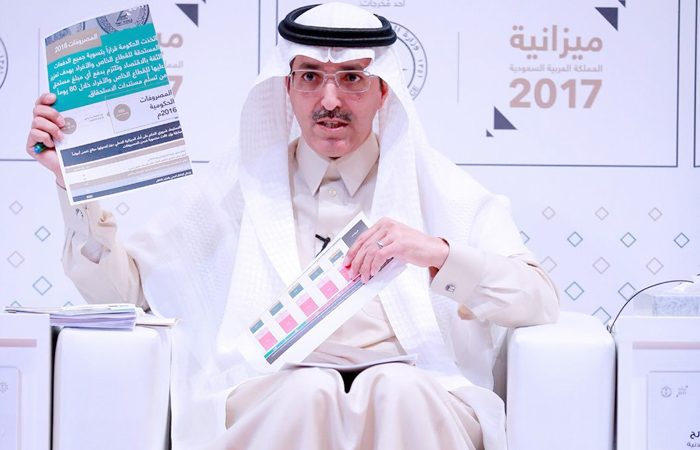
No tax for citizens, expats
Minister of Finance Mohammed Al-Jadaan said that there won’t be any tax on Saudi citizens or expatriates or any Saudi companies.
Al-Jadaan also announced the launch of the 2020 fiscal balance program and the Citizen’s Account initiative.
The minister was addressing a press conference in Riyadh on Wednesday along with Minister of Energy, Industry and Mineral Resources Khalid Al-Falih, Minister of Commerce and Investment Majed Al-Qassabi, Deputy Minister of Labor and Social Development Ahmad Al-Humidan and Deputy Minister of Economy and Planning Mohammed Al-Tuwaijri after the presentation of the national budget.
A fixed amount will be deposited in the account every month and citizens can withdraw the money whenever they need it.
Ahmad Al-Humaidan, deputy minister of labor and social development, said that the Uniform Citizen Account, aims at supporting citizens with low, middle, and above middle income categories so as to achieve economic balance and insulate them while implementing the Kingdom’s Vision 2030 and National Transformation Program. It will enable the nation to achieve qualitative leap and development at all levels and would help in diversifying national income through non-oil exports.
Al-Humaidan said the account will be opened with a total amount of SR25 billion in 2017 and the amount is expected to reach SR60 billion by 2020. He urged citizens to hurry up to register with the account so as to take advantage of it.
Saudi citizens will be divided into five categories based on their income, according to Al-Arabiya.
The categories based on low and medium income will get financial support.
The registration of citizens in unified account will begin early February and the distribution of monthly financial support will begin on June 1.
Saudis whose income levels fall in the first and second categories will receive SR1,200 every month for a family of six persons.
Those citizens whose income level falls in the third category will receive SR1,000 every month for a six-member family.
Saudis whose income level falls in the fourth category will receive SR600 a month for a family of six members.
But Saudis in the fifth category of income and to those with monthly income exceeding SR21,000 will not get any support.
Saudi Arabia will gradually increase the monthly fees paid by companies to employ foreign workers, starting from 2018, Al-Jadaan told the press conference.
The level of fees will depend on the proportion of foreigners in each company’s workforce, the minister added.
He said that the state has disbursed more than SR100 billion in dues owed to the private sector, especially the contracting sector, over the last two months.
“The government has fulfilled its promise made several months ago with regard to clearing the dues of the private sector. We have made payment of all the requests came to the Ministry of Finance from private sector firms and individuals before three weeks,” he said, adding that the remaining requests are now under the consideration of the ministry and the amounts will be disbursed within two months.
Al-Jadaan said SR42 billion has been allocated for the National Transformation Program for this year and another SR172 billion for the coming three years.
He said that budget 2017 aims to improve the level of performance in the public and private sectors to enhance transparency, which is the most important part of the budget.
He also said that the government would not surprise the private sector with any new policy initiatives beyond those already announced on Thursday until 2020.


























